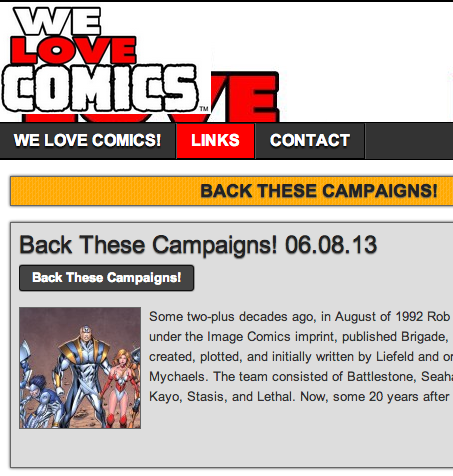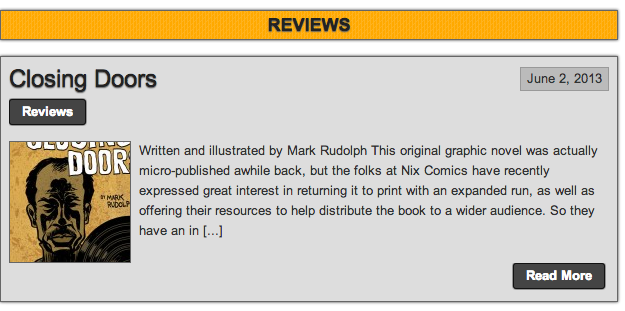 We Love Comics, founded by Adam Post, recently launched with the mission to support comic book creators that are using new crowdfunding tools like Kickstarter and Indiegogo to stay independent. With some awesome resources, featured campaigns, interviews, and editor reviews, We Love Comics aims to create an in-depth and useful asset for aspiring crowdfunders.
We Love Comics, founded by Adam Post, recently launched with the mission to support comic book creators that are using new crowdfunding tools like Kickstarter and Indiegogo to stay independent. With some awesome resources, featured campaigns, interviews, and editor reviews, We Love Comics aims to create an in-depth and useful asset for aspiring crowdfunders.
“The idea behind WE LOVE COMICS is to embrace crowd-sourcing for exactly what it is, for comic book creators to have the means to see their dreams realized. Hopefully, the site will serve as a resource for creators in need of information and inspiration, as many of the comic book news sites can be a bit biased in which stories they cover and how they address those stories. Basically, WE LOVE COMICS want to actively promote the underdogs.”
I’m personally excited for the community that can develop around this website. Comic book creators are a growing portion of the crowdfunding marketplace.
I had the chance to speak with Richard Caldwell, a consultant for We Love Comics, about the vision for the website and answer a few of my questions. You can see the results below.
Why did you and Adam decide to start We Love Comics?
 Adam Post is the founder, Editor in Chief and owner, and had approached me about helping to develop the site. Initially I was to be the Managing Editor as well, although prior commitments are keeping me from joining in the fun full-time. I will be consulting as needed, of course, because I sincerely believe in what Adam is trying to do. He’s been involved in comics publishing for over twenty years, and I have been an active journalist and freelance writer and editor for the last dozen or so years.
Adam Post is the founder, Editor in Chief and owner, and had approached me about helping to develop the site. Initially I was to be the Managing Editor as well, although prior commitments are keeping me from joining in the fun full-time. I will be consulting as needed, of course, because I sincerely believe in what Adam is trying to do. He’s been involved in comics publishing for over twenty years, and I have been an active journalist and freelance writer and editor for the last dozen or so years.
For the last few decades, the comic book industry has been dominated by the two largest publishers, DC Entertainment, which is a division of Time Warner, and Marvel Entertainment, which is a division of Disney. Much lower in the scale are perhaps a dozen mid-range publishers, and even further down are another dozen consistent small press and vanity publishers.
Despite the successes of Marvel and DC in other media (notably film and television) comic sales have been shooting downward. In the post World War Two years comics were selling millions of copies apiece. Thirty years ago, if a mainstream comic were selling a hundred thousand copies it would be cancelled for the poor sales. Now Marvel and DC struggle to have their top sellers consistently sell a hundred thousand copies.
At the other end of the spectrum is self-publishing. Many talents get their feet wet through self-publishing efforts such as underground comix or indie press. But the cost factors alone have silenced more dreams than not. Adam and I vehemently agree that any chain is only as strong as its weakest link, so that if the comics industry is to thrive, then these micro publishers need some extra TLC. And now, with the growing trend of crowdfunding that is becoming a reality for many wonderful writers and artists.
What do you think about the differences between Indiegogo and Kickstarter for comic book campaign creators?
Kickstarter is clearly the elephant in the room, especially with certain film-makers bringing additional attentions to the platform. I think Kickstarter is also slightly more maneuverable in that it’s made itself easier to connect campaigns to a wider range of social networking sites.
You and I know there are many other crowdfunding sites on the web, but both Indiegogo and Kickstarter stand out for being a bit more all-inclusive than the rest in terms of the shear range of projects. All have their place, though. I personally wish they would do more to publicize some of the finer details, such as whether projects are expected to follow through regardless of attaining their set goals. But I do like how more and more campaigners are using their updates to keep pledgers in the know long after campaign’s end. It really adds to the community feel.
What other trends besides crowdfunding are affecting the comic book industry?
Well, as DC and Marvel are the big dogs, many of the smaller publishers look to them to take lead in trends and business models, such as the growing transitions into the digital marketplace. Most of the comic book news blogs and webzines reflect that as well, and give much of their space to those publisher’s announcements.
On the rare occasions when mainstream media ackowledges the black sheep artform it is almost exclusively projects from either of those two companies, so they do inadvertently represent the whole. And to a large extent that is perfectly fine, except that the medium is capable of far, far more diversity than that.
More often than not, with regards to any creative medium, the real innovation will not come from the corporate board rooms but rather from the man on the street. In that respect, crowd-sourcing allows fans old and new to have even more say over precisely where their hard-earned monies go. And there have been more than a few campaigns to surge 400% or 500% beyond their intended goals to sample as proof that pitches shot down by larger outlets can very much have a solid fanbase nonetheless, sight unseen. It can be very exciting.

Anything you have learned from comic book crowdfunding campaigns that you would like to pass on to new campaign creators?
I am becoming fond of saying that inundation only suits dry fields. I see too many campaigners utilize their respective online social networks with a constant stream of cut and paste reminders which I think ulitmately turn off more followers than not.
The most succesful campaigns have generally involved more personalized interactions, and often think outside the box altogether. Coming up with neat rewards is a big part of that. Seeking out responsive media beyond sending a press release to whatever comic news sites is usually helpful as well, like lining up interviews with regional radio programs and podcasts, etc.
While crowd-funding can remove many unnecessary middlemen from the self-publishing process, it does still relegate the creators into the roles of salesmen to a sizable degree. And hopefully WE LOVE COMICS can make that part easier, to free up these awesome folks into having more time to make great reading materials.





